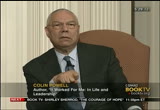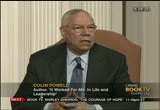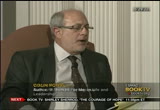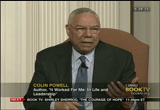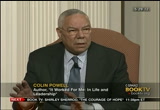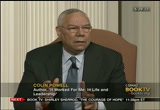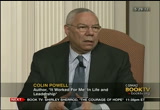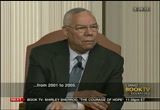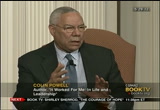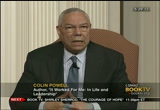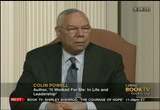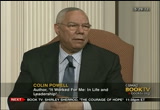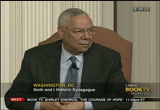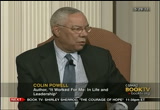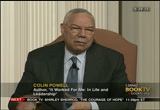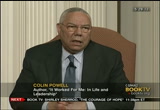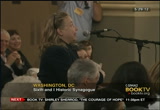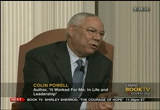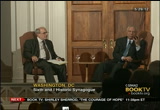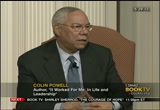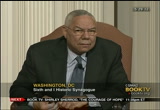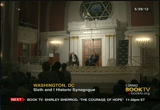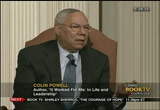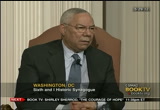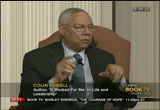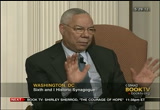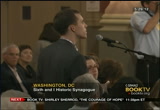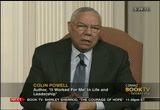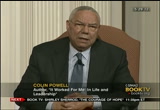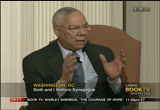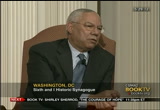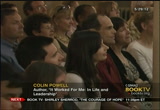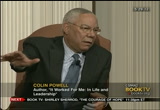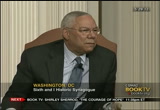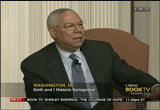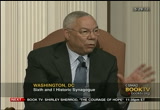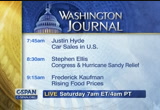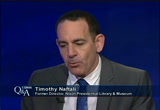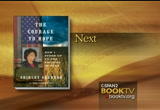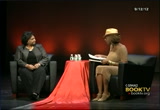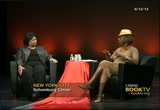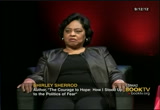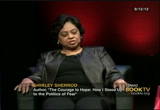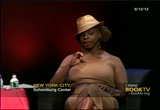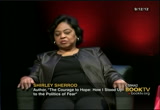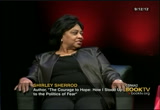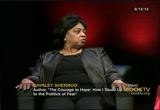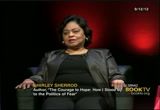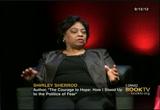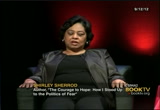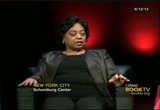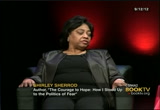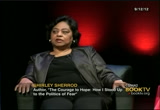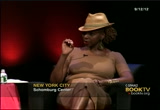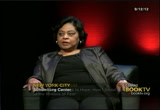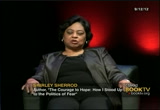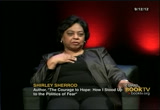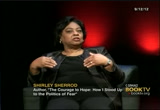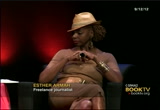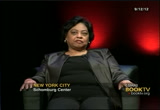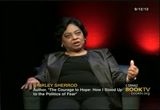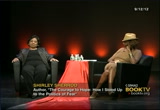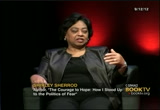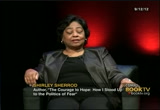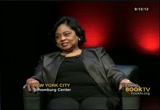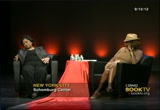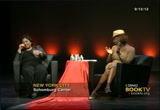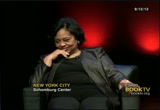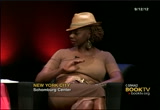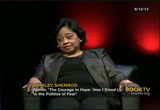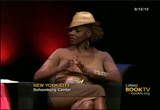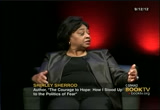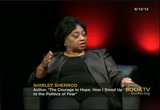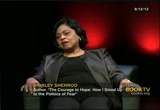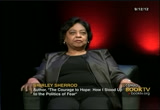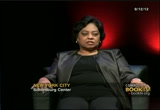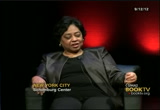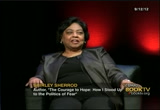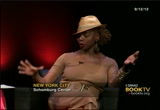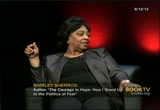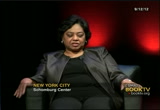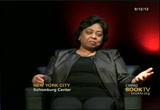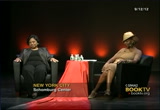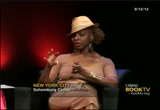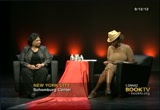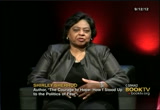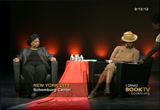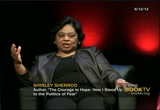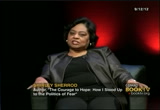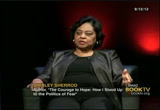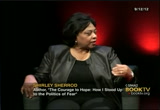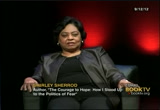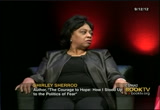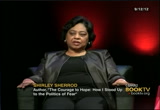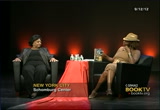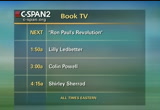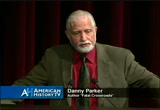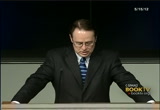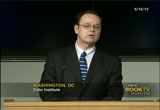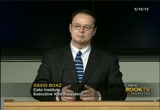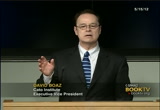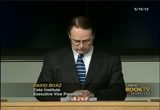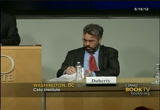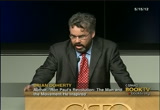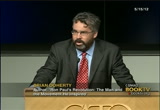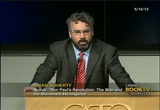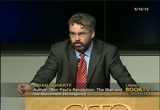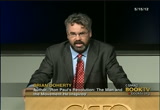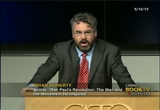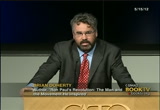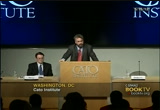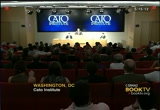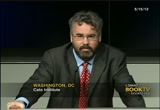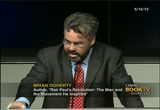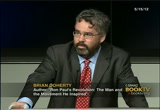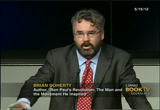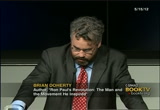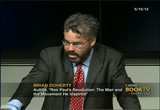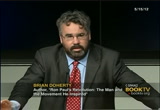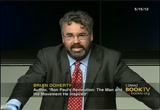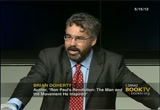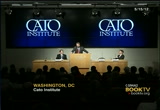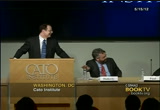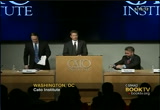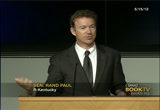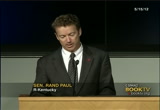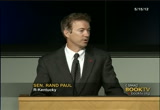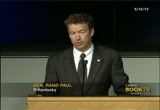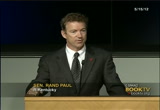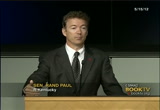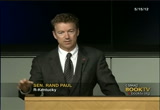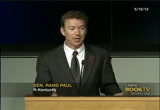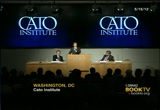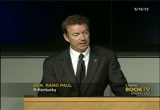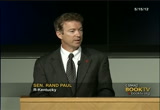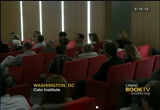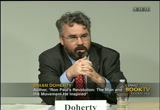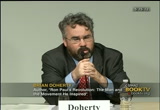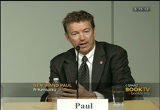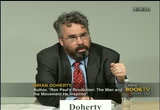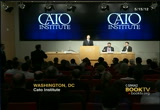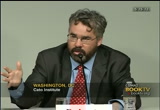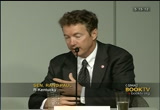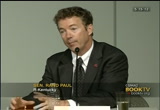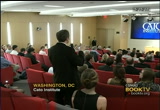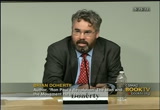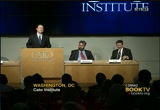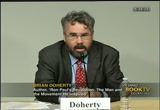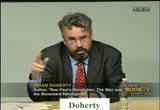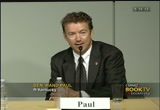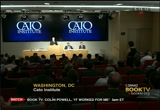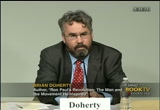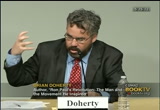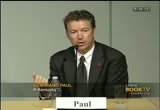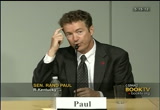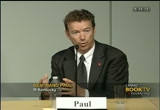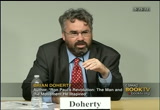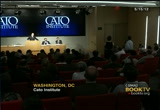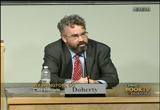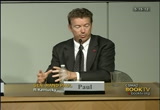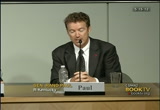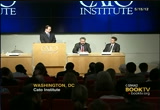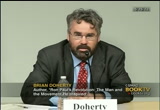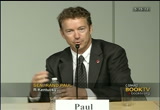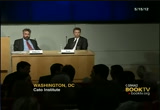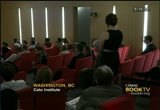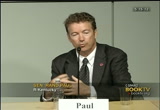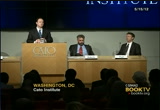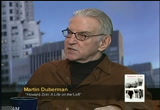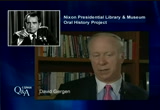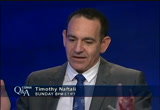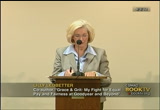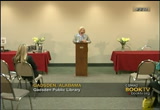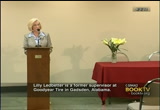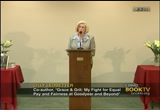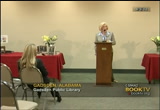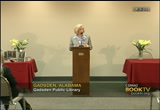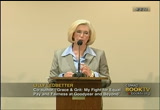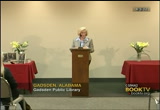tv Capital News Today CSPAN January 4, 2013 11:00pm-2:00am EST
11:00 pm
they're great and i learn from it. but they looking at right now is for this counterinsurgency and what's the best way to go about it? a lot of what i saw in iraq and afghanistan was counterinsurgency. to an infantrymen at stake in the to fighting bad guys and you can call it anything you want good for young private lieutenant commander in the fire fight with somebody for getting blown up by ieds. think what the military is looking at now is that doctrinal concepts are appropriate to this new 21st century world we're living in panama were out of iraq and will be coming out of afghanistan in due course. the good news here is there really is no pure military competitor to the united states of america. the only two nations that even half the potential economic capacity or the population to challenge us i think would be
11:01 pm
china and india because they're large, big countries. but there's absolutely no intent on challenging soa. the chinese are building up forces and we have to watch that and asked for greater transparency. but they're doing too good a job selling it to us. and so while i watch china with great interest as a professional manner, i'm not up to be china is going to become an enemyfg because it got nowhere been our enemy in the past and have gotten very far by not being counting the enemy. ..
11:04 pm
>> if you read the consequences as interest we need to have a clear idea of who would be taking over to power. with respect to iran, we need to put pressure on them. they are not going to give up their nuclear program easily. we have been trying to do this for eight or nine years. they keep insisting that it's just for the production of power. but i have seen some of the things that have evolved. so you can't trust them. the solution may well be okay, if all you want is power, let's talk about how you can do that in the most strenuous regime of inspections even come up with.
11:05 pm
so that if you make the slightest mistake or you are lying to us, it is detectable and he will face the most serious consequences. now, it means that we will attack and bomb and in my world of diplomacy, the most serious consequence doesn't tell you what we'll do. let him worry about what we might do. don't tell them what you're going to do. you just do it. so he will understand. he knows what we could do to him. the other thing that i am more heretical on the my colleagues in the academic community -- i have been around nuclear weapons as a soldier. close to 50 years now. i was taught how to deploy nuclear weapons as a young captain at age 25. i was a corps commander in
11:06 pm
germany guarding part of the nato defense area. we thought we could only think face it for three days. so we calls for nuclear weapons. one day we were studying this problem and the battle reached the third day. and we needed a call for the release of nuclear weapons. and i said let me see the list that we have these on. they were all in west germany. elections have come through. and it was so surreal. the weapons were there.
11:07 pm
i don't think we would've stopped the escalation of the take place. i learned from that experience that these things are really not usable. you can deter somebody with you. they are the ones that wanted to put in strategic defense systems. as chairman of the joint chiefs of staff, i have under my supervision some 28,000 nuclear weapons. 28,000 of them, all kinds. my russian colleagues and i would talk a lot about this. and i was saying that when the cold war was just about anything, we were talking candidly to one another in one day we were talking about the security systems that we had on our missiles to make sure that there weren't any accidents. one of the systems we were
11:08 pm
talking about -- he had a level of security that was higher than mine. he had one more level of protection to keep them from being used. and i said, how come you have this? and he said we lost 40 million people in the great patriotic war, world war ii. we don't ever want to take thatw again.o you know it and i know it. and i said that i agreed. the consequences -- because extensional consequences are as such that it is unimaginable. so when you look at iran, it has 80 million people and it's broke. it's under enormous pressure. people can say that they are crazy. well, i find that a little bit difficult to internalize. because we know they will be
11:09 pm
just what the next day. and they may want to go head and meet up in the sky, but the important thing for them, they feel is to die. >> you believe that they would defy the law that trent lott deck. >> i would not rely on a totally, but i would not dismiss it by saying that they are crazy. they are not crazy. they may not be like us, but they want to survive. they want to survive. the first thing is to use those weapons. so i think that the deterrence and containment played a role in all of this. but i don't want their nuclear program to go towards enrichment towards a nuclear weapon area so i think we ought to put all of the diplomatic pressure on them that we can. because sooner or later it will cause them to rethink the awful
11:10 pm
position they're putting themselves in. >> i once met with a diplomat and said what do you have to say about smalltalk. and we have to find 600,000 jobs every untrained ear, and not doing it. a great political force was at work around the world. and we need to understand here in the united states. the wealth creation through economic growth. china didn't get to be successful where it is now. they did it by making things that we wanted to buy. india is going in the same direction. they need to keep going to bring people up out of poverty. they want jobs. they want to get rid of corrupt
11:11 pm
governments. they want to adjust elect general leaders. what about one got in an argument with local authorities and said enough. and he started the arab spring movement. there are two microphones. we have time for some questions, and we will alternate from one side to the other. we begin with this microphone here. >> okay. i am very proud that you are here tonight. i appreciate you being here to talk with us this evening. since you have been on both sides of alaska was is, do you think that our military forces that it is comparable to anything else in the world?
11:12 pm
are we asking to not only to defend them but to understand them? >> the principles and the reasons for the existence of the military is to defend us and by the state's power. that doesn't mean we can do other things. but that has to be the principal mission in my humble view. the way the constitution is written, we raise and support onerous. fundamentally when you look at japan and germany after world war ii, they were not run by diplomats. douglas macarthur in a series of general is in germany and they were doing peacemaking and peacekeeping and they created constitutional government with these people.
11:13 pm
so the military can do just about anything that they are asked to do. very competent skilled group of young men and women. they exist to fight the nation's battles first and foremost. >> [inaudible question] >> can you move a little closer? >> i would like to ask you [inaudible] [applause] >> well, i did this one go and as robert said, and it's in the books, it was an enormously difficult time. because i felt this obligation
11:14 pm
that was being put upon these people. they said we don't like you. it was not always an animus is suggested. we'll push it over the edge was there was not a single morning i woke up when i thought was the right thing to do. i'm still basically a soldier. and there was never a morning where i wanted to get up and go out and do that. i am so glad that we had the obama's and romney is and all the rest of them. and also i'm not always in favor of it. you see, we have been married this summer 50 years. and we have been a team for 50
11:15 pm
years. [applause] >> the decision was 100% beginning with me. and of course she shared my view. and people say well, you know, she'd marry me when i'm the chairman. she married me when i was a young captain heading off to vietnam for years, leaving her behind. we are very close to serve? >> there is another part of the book says the best thing about being disappointed if you get over it. [laughter] >> thank you. >> was different?
11:16 pm
do you think that educators should allow more choice among the young [inaudible question] >> this is a fascinating question we could spend an hour on. must public-school education, that's what you are suggesting. i know that's what you're suggesting. [laughter] >> okay. one of the things that i have found, and i only took over this in recent years. i have gone over certain things. in high school i was exposed to stuff the bored me to death at the time.
11:17 pm
thirty or for 40 years later, i remember it with vividness. and then we have an appreciation i can still remember the night watch. canterbury tales by chaucer. all of these things that our children need to be exposed to and not just how i pass this math and science tests. how i get through the next day. it would be a shame we don't expose our children to the right things and give them greater choice with what they want to do with their life. most of them at that age are not sure. sooner or later, something will touch them. i know where i'd be if my life
11:18 pm
and have been a pattern of 17. keep looking for the thing that you'd do you do well in the thing you love doing. and don't stop. it is not fame and fortune or the amount of money that you make are the titles that you get. it's doing what you do well. i was talking to a group of students not too long ago. they could've sent me home anytime they wanted and i would have been happy. you have to get kids down from wanting to make a ton of money. the guy who invents facebook or something. you have to get them to find out what they love doing and help them to not stop looking until they find it. sir?
11:19 pm
>> [inaudible question] >> i was an american with europeans -- [inaudible question] >> there were so many things that shocked us completely. then there was an awful lot of movement -- there were caravans leaving into syria. can you say anything about that? >> i saw those reports and we looked at them pretty thoroughly.
11:20 pm
a lot of people said well, the weapons were there and they were either buried or sent to syria. i have seen no evidence that either of those things account for that. there were no weapons. >> when you say that you feel the u.s. military has significant geopolitical information, some feel that the same level of military spending needs to be maintained to the detriment of domestic spending that could benefit us here at home. [applause] >> i'm not sure what the level should be. at the end of the cold war, i
11:21 pm
don't know that that level is in the cards. i don't think so. but i think the pentagon should be like any other governing department, analyzing to see what we don't really need. there a lot of hardware that will be challenged and the pentagon will have to make further reductions. should not spend a dollar more for military spending we need to. we have to find the right balance. and i have confidence in the people who understand the strength of the country comes from an economy that's working well. defense spending is at the
11:22 pm
expense of domestic spending. we will spend what we think we need on domestic issues as well and domestic programs as well. so constrained spending for that which is absolutely needed, domestic spending should be what is needed for the taking care of people and infrastructure and all the other things that we need. but everything should be on the table. it was a mistake not to accept the proposal they came from simpson-bowles. everybody had come to the table ready to give up something. that did not pass political muster. and now we are trying to figure out how to live beyond that. whether it's the pentagon or however we do it, we cannot keep spending $3 trillion a year and only taking in $2 trillion a
11:23 pm
year. the answer is easy. we borrowed money and our grandkids will pay for. well, we ought to figure out how to their government spending down. which means all of us have to give up something. i can think of several things that you can take with me tomorrow that i can complain about. so there are ways to cut spending and also reform the tax code which is absolutely terrible. so the things we can do that you can't quite find the right combination of political support and politicians for whom move in this direction. and it didn't isn't just because of an election. it is those of us here in this country he is examining the
11:24 pm
examining the issues and what all these books and forth. not only what they say they will do, but what they will be able to do because of the strength of their party. we are in charge of this right now. not the super pacs and rich guys writing checks to people. we need to back away from all the television commentators and start taking a hard look at where we are now. [applause] >> are you saying that if the cuts that would take the best -- but it's doable? >> i think the sequestration is not going to happen even though it's on the books. i don't think it's going to happen. because the consequences will be too severe for domestic spending before the defense spending.
11:25 pm
sequestration would double that number. the pentagon is not able to take that kind of reduction. since congress put us into the law, they are just as capable of taking it out of the locked. >> we have just a couple moments for another question. >> yes, thank you, i was wondering if you could talk about the leadership principles. [inaudible question]
11:26 pm
so what can leadership show us and what advice can you give us cars having a strong personality. >> yes, strong personalities. george herbert walker bush, the personality was very strong as well. it includes some of the personalities of the second bush of the first term. we got along well. this time around we got along with so many issues. if you look at what we did to expand nato and support the european union, what we did with hiv and aids. what we did to increase the amount of assistance that we give to the rest of the world. a lot of things we did well and in total harmony. the issue of iraq was appealing.
11:27 pm
but we have different points of view as to how many troops were needed, how we should resolve some of the issues, in early 2004 we realized we want working as well as we should, as a team. it seems like now there are others who have a frequency in regards to this. the president understood the problem. in my view, we were not functioning as a team. so how do you function? everyone needs to have a common purpose or view. they need to trust with each other. i think we could've done a better job with that. and as i say, i was probably one of us the most out of sync with the others.
11:28 pm
the president thought that was a good idea as well. >> i appreciate your point of view so much. thank you. [applause] >> one more question from the audience. >> my question is about americans saying what is wrong with america. i personally happen to believe that with the land of prosperity and opportunity, in your opinion, what is right with america? >> so much. we have a wonderful democratic system that is noisy, it looks like it's riddled with conflict, but it's always been that way. it's been designed that way. but right now it is getting a little harder to resolve. but our democratic system has stood the test of time. we have faced slavery and wars
11:29 pm
and all kinds of challenges. we ultimately come out the other end in pretty good shape. it's the other guys who fell apart. china realized we have to be friends with the americans. so we have this makeup as a nation and a people that takes us through difficult times. and when you look at some of the founding fathers and what they went through, these guys really found each other. [laughter] the two documents i would like to read our jeffersons first and second. in his first inaugural address, it is a beautiful address talking about america and what it means and what we're going to do for the people.
11:30 pm
four years later when he wrote his second address, he was mostly mad and annoyed. he was mostly annoyed at the press. [laughter] there is a long section where he's going on and on. one of the states lock these people up, he says. seriously, i am paraphrasing a little, but not much. saying that they are violating the laws, this and that, and then he pauses and in a typical manner he says given the choice, between allowing people to speak freely or throwing them in jail, i choose the former. and everybody speaks long enough, the truth will win. it will always beat out the lies and overcome.
11:31 pm
we live by that principle. and we have the best economy. it's the strongest economy in the world. so we have a strong economy and military and i think political wealth creation is also very important. above all, we have glue that holds us together as americans. and when i really think about this and see the waves of immigrants that come through the country, it has to do with what it means for americans and how we affect the rest of the world. even though people are complaining about us, people line up at our embassies and consulate offices.
11:32 pm
and people say they want to come to america. the japanese conglomerate asp what city was his favorite and he said, new york. he said new york city is the only one i walked down the street, people come up to me and asked questions. [laughter] if you try them in paris and it won't be the same. [laughter] so they were renewed in fresh with every generation of americans and immigrants coming here. immigrants go to europe to get jobs. and they also come here to be americans. try that in europe and see it hell works.
11:33 pm
the final story is walking up park avenue on a beautiful day. i love to look at the shops and churches. i love to admire all the people going by. i always have to stop at one of the cross streets. i always have to have one. so even when i was secretary of state, i would come out of my suite at the waldorf astoria and start up park avenue and have five bodyguards around me and police cars that will alongside me to make sure that nobody whacked me on park avenue. [laughter] and i always stopped. i always stopped and ordered my hot dog.
11:34 pm
and then he would say you have a green card you have a green car. [laughter] the kind of the something with this. [inaudible] he starts to hand it to me and he says, i know you, i have seen on television. and i think okay. in the end of the money, and it happens over and over. and he says he can't hit me. and you don't have to pay me. he said america has already paid me.
11:35 pm
>> this is still the same way that my parents were greeted many years ago. don't ever sell people short. thank you so much to everyone. thank you all. >> on tomorrow's "washington journal", a discussion of the car industry with justin hyatt. the vice president of taxpayers for common sense, stephen ellis and frederick kaufman, the author of on how corporations in the financial industry influence what we eat. "washington journal" begins live at 7:00 a.m. eastern time on c-span. >> the big discussion that i remember was what is richard nixon going to do. >> i can remember going home at
11:36 pm
night and being scared of that. this is like a timebomb. you know, it's a disaster for all of us. >> the general came to me and said the president's counsel has brought me a list of 50 names of people. and he wants an investigation. that is a very unpleasant thing to have happen. >> shortly after the chief of staff called me. i can't remember what he said, but he said we forgot one thing. and he said that we forgot a resignation letter. and i said that's interesting. i'd be glad to read it. and he said no, you don't get it, you need to write it. >> i thought the best way it was not for me, although i'm a trained historian, was for the key people to tell the story themselves. i thought the best way was to
11:37 pm
start just reprogram that involved players in the watergate drama on the left and the right. to have them tell the story and use portions of the story to let let visitors understand the complexity of this constitutional drama. >> the former head of the presidential library and museum details the oral history project at 8:00 p.m. on q&a. >> shirley sharad was embroiled in a controversy in 2010 when andrew breitbart released a clip of her comments to the georgia naacp. it led to accusations of racial bias, and she was asked to resign her government position. the obama administration later apologized for a a rush to judgment in the case and offered to reinstate her, but she
11:38 pm
11:39 pm
>> so this is a very special moment for all of us here. she is only in new york for one night. she has blessed us and i should let you know straightaway if you would like to ask questions at the end, write them down on the card. we will take those cards from the people at the very end. so i would like to start with a beautiful conversation that we had. this was page six of the book, and you talk about when you were a child, he would drive down the back roads of georgia and how scary that was. you said through this incident
11:40 pm
that there is more than one way to terrorize somebody. based on what happens. >> well, back in those years it was really scary before we were liberated. [laughter] but to have this happen, i mean, you are only trying to do the best that you can for everyone. to have someone take your word and to use the equipment that they have today to cut and splice and make your message appeared to be the exact opposite of what it was and is, it is just and on the legal situation, and it is a way to
11:41 pm
terrorize someone. you don't know that you will ever be able to really get the truth out. but i was determined that even if i had to tell one person at a time, you know. >> it makes me think that there is this whole energy around this book. the last time this energy was july of 2010. we are going back to those places and those people who are making those accusations and calling you a reverse racist. how do you feel being back now that you have the whole story? >> it feels good to know that i was able to use that same media to be able to get the story -- the wright story out. it's a feeling i can't explain. how great it feels to be able to
11:42 pm
sit here. it is really amazing. i made the decision years ago that i didn't want people to forget my father and what he meant to us. but i had no idea that i would be able to tell the story in this way. it feels great. >> what is so beautiful about this story? it's more than a book? is a living history? a love letter to choices, and it reminds us that without the feeling, the facts don't convey what history has been. and that as brutal as the history of african americans struggle for humanitarian rights and it has been humanity and love and family and choice and
11:43 pm
possibility and sacrifice. i'm wondering if you could go back. >> i know you were trying to go gangster by driving that truck. [laughter] >> well, you know, in baker county, read about some of the shares of earlier years. the gator actually rules everything and everyone in the county. you can't imagine looking at the restrooms were earlier days,
11:44 pm
my great grandparents came to baker county. i don't know if they came in waves or not, but they ended up as sharecroppers with the intent on buying land. and that they did. they brought enough gumption and bought some land and the hawthorns lived in one area. the williams in another. we were all one big family. and so we had to help each other. so my father, there were five girls, any farmer once assigned. i guess any man. my mother kept having babies, and they were all girls. we all had nicknames. [laughter]
11:45 pm
>> that is hilarious. you know, situation we were in, we felt safe and comfortable there. and i feel like my father wanted us to have an education. he knew that education was the key to a better life. he did think i believe that all of us would come back home and work from there. i grew up with lots of family and community support. i went to a segregated school. supposedly giving us equal in separate but equal facilities.
11:46 pm
>> one thing they drilled into us and the church and in our homes and in the schools was that they expected us to do good. they expected us to go and do good and reach back and help others. [laughter] >> that's powerful. >> we are in day three of this huge teachers strike in chicago. so there is a battle for public education. >> yes. >> so your dad was killed? yes. >> it goes back to that time and what happened and what you know about what happened, and how your family work through that. >> it happened at a time when i look back at those days. my father was as happy as any man could be.
11:47 pm
my younger sister was eight years old, my dad wanted to try one more time and he knew this was a boy he said. we were concerned. one day at school my best friend asked me how is your mother, and i said she doesn't seem to be getting any better. and my friend said your dad was at the store handing out cigars, your mom's going to have a baby. she told everyone. he was feeling on top of the world. we were getting a new home. he was able to get a loan. the first black person to get a loan through the home administration to build a home. he wanted a brick home, but the white county supervisor told him that a black person cannot borrow the money to build a brick on. so he and my mother picked the smallest block.
11:48 pm
so the oldest was about to graduate from high school. to run off to college. we went to church the day before. we were always in church. and i was driving the family to church. we met this man on the road to church. he told my father he was coming to get the cow. my father said if you come back tomorrow, i will come back around. so they agreed to meet at 9:00 o'clock the next morning. the next day we all got up and went to school. midmorning the principal called on the intercom for me to come to the office. i went to the office and that is when they told me that my father had been shot.
11:49 pm
they sent for my other sisters and they were afraid. the teachers and principals did not know what to do. but finally one of the teachers said she would take us to the hospital where they had taken my father. she was so afraid. i can remember. there was a small bridge across the river into the next county and you could barely get two cars to pass each other on the street. that was the only way to get to the next county without going 30 miles out of the way. but you were supposed to go through the little downtown area to get to the bridge. she actually went around to take us to the hospital. when we arrived, they had actually moved him to albany at that point. it was actually the next day when we got a chance to see him. he lingered for 10 days before
11:50 pm
passing away. i remember on the night of his death that the house was filled with people. my mother was seven months pregnant. the baby was a boy and he was born two months after my father's death. people were coming to show support for us. and i just didn't want to be around anyone. i went into one of the rooms. i felt as the oldest that i needed to do something. i felt that if i had been a boy, i probably would've been able to get get a get a gun and kill the man cannot change my mind. but i certainly couldn't do that. my father tried to teach us to fire a weapon monday. all of my younger sisters were taking their time with the gun, but he put the gun in my hand, all i could do was cry. i knew that i couldn't get a gun
11:51 pm
to try to kill the man. but i needed to do something. i was praying and i remember a thought that came into my mind. my folks did not know that i didn't intend to live in the south. i was applying to schools in the north. i really did not want to live in the south. because of the conditions we were living in. i didn't want anything to do that again in my life. i would talk and say, just wait. [laughter] >> so the thought came to my mind that the thing i could do would be to give up my dream of living in the north to stay in the south and devote my life to working for change. i felt a columnist after that.
11:52 pm
i didn't share that with even anyone, and i didn't know how i would do it. we were not involved in the civil rights movement. others have been working in the movement since 1961. i.t. is about it now. he had not come to baker county to help get the movement started there. but once my father, who was a leader in the community with murder, that was one thing that brought everyone together, and they were ready when they came in to help us, the baker county movement. >> wow. what's the interesting part to me is in the book you really write about the way that the legacy impacts you.
11:53 pm
so you talk about the fact that when that happened, the black children lost father by friends found themselves living in this no man's land and we didn't get the chance to really feel the price of those young folks paid in order for us to be where we are. we know it intellectually, but we don't get to see that. and that is something that the book really does beautifully. >> we started the movement in june of 1965. in august of 1965, about 15 others and my sister decided to integrate the white schools. i can remember the first day. i had graduated and was going off to college in september. and we took them -- we tried to
11:54 pm
take them to the school. of course, it was about a block away stopping us. the next day things would happen. some of those same people were probably clan members as well. but they were eventually able to start school. but there were signs in school and the teachers would refer to them as negroes. the thing that was so hateful that impacted them so much as well, you see, they had arrived
11:55 pm
by bus. they were not allowed even as it was raining to come into the black schools to wait for the bus. these were our own people doing this. those who were juniors and seniors could not attend the prom at the white schools are the black schools. we had a program about three years ago. some of them are 60 years old now. they feel so much. we had a program where we got a congressman, a secretary of state, we did lots of things to try to help them understand and
11:56 pm
share what happened to them. even though that school has been turned into a center for the community, and this is one of the things we have done, not someone else -- we have done everything we could do to hold on to that building. people can come in and get on the market. head start and other programs, all individuals who are hurt so much as juniors and seniors by her own people. >> wow.
11:57 pm
>> this is all of these years later because they remembered what happened to them. even though the people who did it, many of them are not even living now. they still can't let go. >> wow. you know, this idea stayed with us generations to generation. we carry what happened emotionally. the reality of those that walk the journey is not something that we get a chance to experience. it's such a beautiful way that the book fills in those gaps. you can feel it and you can breathe air. it is so emotional. it made me cry so many times. so to come back, i was seven months pregnant.
11:58 pm
and you say that really talking about how strong her mother was. because the family changed so radically. we talk about the fact at that time that someone dies there is no counseling and nothing to help the family deal with the loss. it's very potent. >> that's right. they bring counselors and now when there's a tragedy. we didn't have that. each of us have to deal with this in our own way. my father was murdered in march. he saw the movement in two weeks after that, i left to go to school out of state. a group of white men burned a cross in front of our house. my mother and four sisters were at home. like i said, we moved into the new home one week before my father died. so he was with us in that house
12:00 am
[applause] >> they actually allowed them to leave. they had surrounded these white men, and allowed them to leave, and then suddenly showed up with the investigation people, and they were all aware of what's going on, and then nothing really happened as a result of identifying some of the people. but my mother, she became -- when daddy was living we felt like there was six girls. he was just one of us. 11 years after my father's death -- when my mother announced to us, i'm running for office, i couldn't believe it but i was happy.
12:01 am
[applause] >> that year decided he was retiring and one of his sons would become sheriff. so he had one of his sons running for office. so we were running into some of -- as we came -- campaigned around the counties, running into some of them. and then on the night of the election, we were in the courthouse -- this is like something from the movies. stuff from out of mississippi and other places. it was happening right there in georgia. we were at the courthouse that night, standing -- because they war counting the paper ballots and we were watching them count the ballots, and out of the back room the gator walked past us and spoke. then he realized after walking a
12:02 am
few feet away he had just spoken to sheryl sherrod. he was angry because we had been having meetings and my father kept saying do not put another johnson in office. so he walked a few feet away and came back and said, i take that back. i didn't know who you were. and so he is standing there, with a gun on his side, and my husband is standing there, and they are staring each other -- just staring at each other, and i was about to have a heart attack, because i knew, even with all of those people in the room, that gator was just mean enough to pull his gun out with everyone there to shoot. but someone ran outside and got his son, the one would was running for office, and then he ran in there and grabbed his daddy by the arm and said, come
12:03 am
on, just leave that alone. show pulled his daddy out. i can tell you that night driving from newton, the city where the ballots were being counseledded, -- counted, was very scary because we had to go highway 19 and i didn't feel like the gator felt like it was over. but the son did win, and my mother won, and -- [applause] >> she became the first black elected official the baker county, and believe it or not, she is still serving -- [applause] >> we convinced her this year -- although they were all begging her, please stay in, because she has been the voice for people on
12:04 am
that board -- for all people but especially black people on the board of education in baker county. you know, her first meeting back in 1976, the superintendent introduced her as -- he said i want to introduce our newest board members. joe hall's daughter, and there was this old board member said, is that the nigger joe hall? joe hall is an honest man. he found my wallet and he brought it to me and all the money was still in there. that was it. you know. but she is a strong woman. we convinced her, though, to just give it up. you have so many things happening in education. the superintendent begged us to -- if we had gone along, her children, with another four years, i'm sure she would still
12:05 am
be there but we thought, it's just time. it's time for her to enjoy life a little more. she is always on the case, always -- whether it's in education or whatever, she is the person people go to in the county for help. [applause] >> and so with all this political activity, you still manage to find love. let's talk about your man. [laughter] >> in love with a freedom writer. charles sherrod. [cheers and applause] >> now, according to the book, you know, a young man was interested in a young lady who
12:06 am
wasn't too interested in return. what was up. >> you know, he met my family before he met me, and for all of these years, until about two years ago, i thought he wasn't telling the truth. he kept telling me -- he said, when i saw your pick tier, said, i'm going to marry that girl. my sister said it's true. they kept talking about this other sister they had, and he wanted to see a picture, and they showed him a picture, and he said i'm going to marry her, and sure enough, within three years we were married. >> yeah, love. [applause] >> so, you get married and you and your husband are working together. you're both in the movement and really dealing with the issue of discrimination and establishing
12:07 am
the degree to which the discrimination works. and then you are pregnant with your daughter, russia, and sherrod is deciding if he is going to take a trip to israel and figure out farm until a completely different country. you just had your baby, the. >> yes. when i married him, i realized i was marrying a person who was married to the movement. i admire that in him. so, i had to steer -- share him with everyone always. >> but at it beautiful the way you write about when you had to resign and you called charles on the phone, and charles was the one who soothed your spirit as you were driving home on that day, july 2010. so, we have something in common. you made a trip to ghana, you write about that in the book.
12:08 am
going to ghana, going to stand in that space where potentially your an an -- ancestors, african slaves, may have come from. >> my goodness. the reason why i had the opportunity to go i had applied for a kellogg scholarship and didn't think i would get it, but during the time of the interview, one person asked me, shirley, is there something you've always wanted to do and you never had chance to do? i said, yes. i always wanted to go to africa. he said, where. i said, ghana. so, the first thing i did after i was notified i had the scholarship and could start traveling, i went to ghana, and i was so excited that couldn't sleep. i was just -- the thought of getting to africa, you know, a
12:09 am
place where my ancestors came from, i couldn't -- it was just more -- i can't describe what i was feeling, and i just couldn't wait to get there, and to ask them, you know, what do you think of african-americans, and i asked everybody. >> it's interesting because in all the travels, that's what you see, this thread through your book, of trauma and trouble and challenge and discourse, and your choice to find a way of resolution every single time. even in ghana you have the dinner -- african-american-ish and you become the united nations and navigate through. so there's this thread, and you come back and you're working in dealing with the discrimination that black farmers are facing. so you're on the other end of the usda, seeing exactly how the
12:10 am
discriminatory policies are on the ground, and having land foreclosed upon, and knowing there was a mean-spiritedness about the way they would foreclosure on their land. tell us about that. >> one of the things i had to do -- and i was determined that everyone who worked with me did that. we -- i made sure we learned those regulations better than the folks they had working in the offices. so you would know when they were doing something or saying something wrong. you could know when you were -- anyone who has ever had to deal with discrimination, know when that happens. but to know exactly what that person is doing to you that is wrong is what i wanted -- and i needed to be able to do that to challenge them. i can remember a farmer called me -- he had been -- received a letter to come into the local office, which is about 60 miles away.
12:11 am
he asked me if i would come to go to that office with him, and with his wife, and i said, yes. so i drove down to that office that morning. we went into the office with the county supervisor, and he started telling the farmer that he was going to foreclose -- the farmer had a farming loan and home ownership loan two different kinds and he said he would foreclosure first on the farm and then the house. well, the farm is where he start ed crying during this speech that he was making because the guy would never stop. i was trying give him a chance to finish what he had to say but it was obvious he was just going to keep talking and talking and talking and not give us a chance to respond. so, i stopped and said, will you put that in writing. he said i ain't putting -- no.
12:12 am
he didn't say that first. what he did was when i said, will you put that in writing, he pushed his chair back from his desk and started looking at his feet. he eventually turned the chair all the way around, looking at the floor, and then looked at me and said, i ain't putting nothing in writing. so we went at him. oh, did we ever. i wish to this day i could remember what i said to him, but i can't. so, he eventually -- somehow we -- he told the farmer that he would get a letter in about six weeks, and that was the process, and the farmer had a bad sinus problem so he coughed a lot. mr. smith, you should do something about that cough, patting him on the back. well, i want you to know that everytime that farmer got a letter, stating what action they would take, we appealed. i went to so many appeal
12:13 am
hearings, sometimes i forget. what are we here for this time? but i stayed on that county supervisor's case, i submitted to many complaints, he eventually left the agency -- . [applause] >> and that's -- that land is still with that farmer today. [applause] >> on the other hasn't, i had a white farmer -- you have interesting things that happen. the one white woman from the county where i grew up, had a boyfriend with a farm and he was experiencing some problems. so he wanted me to come to look at her -- to lunch at her house. a black woman who i knew was her housekeeper and cook. so i said to my husband, you got to go with me, man. we went to lunch at her home,
12:14 am
and then from there the white farmer and his son -- we were going from there to the county supervisor's office about ten miles away. we walked into that office -- the county supervisor was expecting the farmer. he wasn't expecting me. so, we walked in together. so to get rid of me -- he wasn't sure why i was there, i guess. he knew -- he had heard about me. many of them had. so, he told this farmer to walk down the hall to another room. well, the three of us walked down the hall to the other room. so, he knew then, without a doubt, i was with them. so he sat down and started talking to them, but he tried to turn in such a way that he was turning his back to me, but everytime a response was needed, i responded. i didn't let the white farmer respond. so, finally he realized he had
12:15 am
to talk to me, too. and of course, i dealt with the situation for that white farmer. there were many, many, many situations -- i'm sure -- i heard in east georgia, one of the county supervisors was saying, you better not come over here with that mess in east georgia. well, i went one day -- [laughter] [applause] >> i just can't -- this young black man -- his grandfather was giving up the farm, and he was interested in farming. now, he had just been highlighted in one of usdas publications because he worked to restore conservation, helping a white farmer. but when i prepared his business plan, they denied his loan for lack of experience. so, i told them, the process for
12:16 am
dealing with that is that you have to, within the first two week of denial, request an appeal hearing. he called me. i said, request the appeal hearing and i'll be there but do not tell her -- it was a woman -- do not tell her i will be there with you. so on the date he was given for the hearing -- i had to drive 150-miles to get to him. so by the time i was there i got -- i was mad. and i had heard that they -- the mess i was doing -- so the poor woman -- i think about it now -- i want sit, and i was on her so she was trembling. but the young man got his loan. [laughter] [cheers and applause] [applause] >> i felt bad about the way i
12:17 am
treated her. but... >> and i think it's important to understand that you come from the space where you had been on the receiving end of the discriminatory practices of the usda so when you walked into the usda to become the first director -- black director of rule development in georgia in the president's administration, you had this unique history of having personally experienced the discrimination and having helped both black farmers and white farmers navigate something that was racist, and you have all these stories that prove that again and again and again and again, to the night the book when you submitted your regs anyway all these letters cam from farmers. and one letter of support wrote about a usda loan official who
12:18 am
kept a noose in his desk. he use open the drawer and you would see the noose and then he would shut it as he was having an annual -- actual meeting with black farmers. that was the reality you walked into and then get fired by the first african-american president. so we did all of that and come back to the beginning, july, 2010, and the president does call you, and -- this is what you call, i'm having a conversation with the president of the united states. has a few things about the jim crow south. talk about that conversation. >> well, when he was -- i was actually here in new york. i had just been on "the view." and was in a limo on the way to the airport with cnn when i received a call that was 404
12:19 am
area code, which is atlanta, so i answered that. and it was congressman john lewis. when we finished talking i thought i should check my text messages because i couldn't keep my voice mail clear enough to keep getting messages, and lo and be hold there was a message from the white house saying the president was trying to reach me. so, i called the number, and they wanted to arrange the call. so, -- so interesting, these people in the immediate -- in media, the person who was in the car with me from cnn, pulled out a camcorder. i said, you cannot tape me while i'm talking to the president. so i made her turn it off and put it away. [applause] >> so, he started out by saying, you're a hard person to reach.
12:20 am
well, everyone knew i had been with cnn all week. i didn't say that to him, though. [laughter] >> but anyway, he started out saying, you know, i would be called about a position they wanted to offer, and then he said, you know, those issues you have been putting out there are -- well aware of them. i said, no. you don't understand those issues the same way i do. so we went back and forth. and i'm talking to the president but i didn't -- well -- [cheers and applause] >> so he is trying to tell me, if you read my book you'll know i understand. and i said, no, you don't understand these issues the same way. so we we were going back and foh
12:21 am
and he told me to read his book and i would see and i said no. and i said, you should come to southwest georgia, and he said, sanford has been trying to get me to come. sanford is the congressman from the second congressional district where i live, and i said, well, you should come, and when you come, bring michelle with you. so, we left -- that visit has not happened, but he also told me the young man who arranged the call to get to him and if i had a message for him on an issue or whatever, i should contact that young man. i didn't keep that number, though. i don't do stuff like that. [applause] >> well, since the president kindly offered you his bugatti
12:22 am
you should offer him -- -- [cheers and applause] >> we're going to take some questions before we finish up, and you will get your chance to get your copies and miss shirley is going to be signing those. i know that folks have written questions down. so miss daisy is going to bring up some questions that we're going to be able to ask you so that you can have a conversation with part of our audience. and this is sort of emotional for me. i was in the movement. my family was in the movement. and i'm ghanaian, and this is the beauty and the power of history crosses borders, breaks down boundaries and that the truth, when it comes to this history, is a global one, is a universal one, because i feel like in the way that you wrote it, i got a chance to hear things that my father never got a chance to say, and i think one
12:23 am
of the things that is missing in generation is the silence because the pain is so deep. and what you do is you kind of sit on that scar and you live that silence, and that's a beautiful thing, because it means there's a whole generation that get a chance to understand this portion of history, the jim crow south, to this moment in a way they could not possibly have done. this book should be in schools, should be on the curriculum. >> we're just going to take a few questions before we close out. >> okay. do you still believe that integration was enough to dismantle white supremacy, and economic exploitation of african-americans and what else do you believe needs to be done
12:24 am
when it comes to racial and economic injustice? >> integration obviously wasn't enough. we thought -- i think back to when we were integrating the white schools. we thought simply putting our children there was enough, but we didn't provide the support that was needed to help them get through that experience. and we sort of let white people off the hook with that as well. they did the things they did, and it was bad for us in baker county at least. it was at a time that people thought, we can register to vote. we can even wear -- we can sleep anywhere. our children are in the white school and we have done the job.
12:25 am
but we didn't. there was so much more that had to be done, and those of us who lived through those years of segregation and jim crow, the hurt was so deep that we didn't want our children to experience that, to know that. it's almost like we want to wipe that part of slavery and those years away so that our children can just be in this society and move on. so much is happening to them that they don't understand because they don't know the history. [applause] >> so we have some -- this is a two-part question. what are the main charges in developing the next generation of small -- with that in mind,
12:26 am
what is the community planning? >> well, just like me, just like i was back in those years, when it comes to agriculture, we, i think, think only of picking cotton, or shaking peanuts, but let me tell you, there are machines to do that now. it takes almost an educated person to run those tractors, and those tractors have f stereos -- fm stereos in them. when it comes to agriculture can we run away from it. so the land, that we had, as black people, most of it is gone. we didn't realize the asset that our ancestors coming out of
12:27 am
slavery acquired and left for us. so, around 1920, 109 -- 1910, right in that era, black people owned almost 15 million acres of farmland. today that's down to around two million and we're still losing. growing your own food and getting in touch with the land, you know, you can learn just about -- you can learn so much in life, so much that can take you through life, by connecting with the soil. kids can learn just growing -- they can learn math, they can learn to read. there's so much to be learned. so much that the earth can give to us, and in addition, good, wholesome, healthy food to eat. we need to know how to grow it. [applause]
12:28 am
>> when we think about the challenges with african-american communities and food deserts, foodity, and the challenges to getting fresh food into community. another question about farming. how does one who is considering small farming for a living compete with the kind of thing o corporations who are squeezing out the small person with land purchase. >> let me tell you about something we are doing now. all of our systems are being mandated to buy local produce. the thing that is keeping our farmers, small farmers, from being able to access that market and others like it, is that you have to have a facility to be able to bring that produce in to
12:29 am
be properly washed, graded, packed, cooled, before it can be delivered, and in some cases, chopped or sliced. one -- one small farmer alone can't make that happen. but getting farmers to work together in groups, they can. so, right now in albany, georgia, that's one of the major projects i'm working on, trying to get a processing center for farmers to be able to use so they can access markets. they don't need to compete with farmers trying to sell to big chains because they can't. but there are markets -- all of us need to eat. all of us need to eat. there are markets right around them, and people who are right around them need to support small farmers by buying from them.
12:30 am
>> this is going to have to be the last question. so we're covering three and four questions at a time. the last question. who are the heroes that inspire you, and specifically for a younger generation, what advice would you give to a younger generation facing discrimination they way you did as a child, as an obstacle, and what would you say to them to encourage them to speak out for justice as you did in the end, too. >> there are so many people that inspired me, but so many people that inspired me -- that really have such a -- an impact on me and the work i've done, those people you don't hear about. those women in communities who give day in and day out, not for the recognition they get, because they'll never be
12:31 am
recognized for what they do. but they give over and over. and they're not afraid. i can remember my husband talk about an older woman in lee county, georgia, she is deceased now but calls her mama dollie. she was a mid-wife in her earlier years but she would set up at night with a shotgun, patrolling, allowing the workers to get some sleep, and -- [applause] >> my own -- during the first march in baker county, as white men were beating charles sherrod nearly to death, he threw her body over him and said, if you don't stop, you'll kill him. at it people like that. people who don't look for the recognition but they work anyway.
12:32 am
they help to make our communities work. [applause] >> i think there was a question about new communities. >> new communities. we created an organization back in 1969, and due to discrimination, we lost the 6,000 acres we had in 1985, and that was discrimination due to -- i mean, discrimination on the hands of the county supervisors at farmers home administration. we became -- i say we -- the communities became one of the claimants in the pickford case, and ended up getting the largest award in pickford, and because of that, new communities bought more land and we have programs. they're being -- on that land
12:33 am
beginning next month. they will be harvesting pecans. and you can grow oranges in georgia so we have oranges. >> peaches? >> not peaches yet. but we'll be planting peaches, and probably grapes like we had in the old communities, and lots of training around agriculture, and we also have a racial healing project going. that some interesting work, to be able to sit down with white people in the area, to talk about race. not easy. [applause] >> the book, another book, a living history, a love letter to the revolutionary practice of forgiveness, the importance of
12:34 am
choices, the reality that history is so much more than information. it is our emotionallallity, that silence from generation to generation, does not help us create a better present. we have to open that up. the book is called "courage to hope: how i stood up to the politics of fear." miss shirley sherrod. [applause] [cheers and applause] >> tonight on book tv, the author of ron paul's "revolution" talks about the career and influence of the texas congressman. and then the legal fight against unequal pay for women, and
12:35 am
collin powell talks about his memoir, and shirley sherrod on the controversial internet video and accusations of racism that lost her, her job. >> i don't know. someone took a shot, and as soon as i shot this part i went down, and i think was something like 96 tanks, and each one would fire into the group, and then they came around, they shot -- to put it simply, 150 captive and 84 were shot down by ss forces that captured them. the survivors, including ted palusch, played dead in the field after they were -- they were fired on by machine guns at close range. from the distance from myself at the podium to you sitting in the
12:36 am
audience. this range. machine guns were fired at these men. they didn't run. they fell to the ground. >> december 17, 1944. an american convoy in belgium is spotted and captured by german troops, sunday night at 9:00 eastern and pacific. part of american history tv this weekend on c-span 3. >> you're watching c-span2. politic and public affairs, featuring live coverage of the u.s. senate. at night, key policy events and on the weekend, booktv. you can see past programs and get our schedules at our web site and join in the conversation on social media sites. >> the book "ron paul's revolution" looks at the career and influence of congressman ron paul who recently retired from politics. the texas republican served 12
12:37 am
terms in the house of representatives and ran for president three times. the book's author brian dougherty spoke at the cato institute in washington. this is an hour and ten minutes. >> all right. good afternoon. welcome, everybody, to the cato institute. i'm david bowes, the executive vice president of the institute, and we're trying something a little different here, doing an event after work hours. we'll see how that works out. but hopefully it's good for people who have jobs, and -- [laughter] >> can't come to the events we do usually at noon. so we're glad to have you here. glad to have a very interesting discussion of ron paul's revolution. about 30 years ago, there was a book published about the early years of the libertarian movement called "itoo usually gyped with ayn rand" and that's
12:38 am
what we found here at cato, the student whose came to us, had federal read ayn rand, read "atlas shrugged" and i think you can say over the past six years it usually begins with ron paul. that where you get more people getting their first taste of libertarian ideas and then maybe they move on to read cato policy studies, ayn rand or whatever. but a lot of people being brought to the concept of liberty and limited government by ron paul and his campaign, and to me it's clear that he got more attention and more success and more votes in this cycle, 2011-12 than in 2007-08. and i had a lot of reporters ask
12:39 am
me, why is that? and i think the clear answer is, not because he did anything very different. he has not changed his views. he hasn't changed the way he presents them. what did change, i think, was the public policy environment in which he was talking. back in 2007, ron paul warned that an economy based on debt and cheap money from the federal reserve was not sustainable, but the economy was booming and nobody wanted to listen. and then, after the financial crisis, when he came back around 2011 to campaign again, they were listening. in 2007-8 he said what's wrong if the federal reserve? by 2011. everybody was willing to listen to criticism of the federal reserve board. in 2007 he talk about overspending. how the republican party spent more than any president in
12:40 am
history. republicans didn't want to hear that. by 2011, perhaps because there was a democratic president, republicans were a lot more ready to hear that, and i think in 2007, ron paul talked about endless military intervention, and at that time republicans were determined to stand in lock step, say the surge is working and refuse to listen to any criticism. by 2011 even republicans were getting tired of endless wars. so that changed the context in which the second ron paul campaign took place and caused him to get more attention, and voters than he did before. many of you know there are headlines today saying ron paul ends come pain or suspended campaign. it's clear to me, if you actually read beyond the headline, the campaign is not over. what he said is, he is not going
12:41 am
to go run expensive television ads in the lingering primaries that nobody is paying much attention to. hies going to continue to do the kinds of things he has been doing. talking about the issues. giving speeches to college students, and his volunteers working hard in caucuses and the other places that delegates are actually selected. so that's an interesting unfolding story still going on. how many delegates can ron paul get. but that doesn't really matter to us today because this book is not about rob paul's campaign. this book is about ron paul's revolution, which is a broader topic than a specific presidential campaign. brian dougherty is becoming the historian of the libertarian movement. he has written books on the burning man festival and on the on the supreme court battle over the second amendment, both of
12:42 am
whom have some libertarian content. he more particularly wrote the book "radicals for capital limp a freewheeling history of the modern libertarian movement" which i declared in a blog is going to be the standard history of the libertarian movement for a long time. it's a massive work of research that will be the standard source for people studying this mom. brian doherty is the senior editor of reason. before that he was a journalism fellow at the competitive enterprise institute. but most importantly he started his career as an intern at the cato institute. in fact, i think we had five interns that semester, and one was brian, and one was the distinguished scholar, brian kaplan who is here in the front row. that was a pretty good record for that year's intern class. bryan doherty then right-hand as perhaps the youngest editor of
12:43 am
magazines before moving on to other editorial projects. he has been covering ron paul since 1999, which is obvious in this insightful and well-researched book. so please welcome the author of "ron paul's revolution." brian doherty. [applause] >> at the all very much. i'm going to talk for 20 minutes and then there will be questions later. i'm going to start with what i think was a very interesting frame from my history with the topic of my book. unfortunately the end point of it extended beyond the book itself so it's not reflected in the book. and as of this point it's the first time i met ron paul, and to this date the last time i saw ron paul. both of them were events at large state universities. the first was at the university of florida, when i was a college
12:44 am
student in january 1988. he was rung for president then, too with the libertarian party. i was a member of the university of florida college libertarians we earned a speaking engagement for ron paul at our campus, and we drew, i think, about 100 people, which excited the hell out of us. it was an amazing success. ten time as many people have come to any u.s. college libertarian event. but they were all there to examine a curiosity. it wasn't even 100 libertarians. it was people, third-party presidential coached let's check this out. our greatest triumph was getting a 600 word article in the school newspaper the next day and after words we took dr. paul to an ihop. there's a picture of that somewhere. we thought it was the height of radical scruffy political activism. it's great. a few weeks ago, the last time i have seen dr. paul was also at large state university, at ucla,
12:45 am
in los angeles, where i now live. 7,000 people showed up to see ron paul running for president again, this time with one of the major parties, and they were not curious, curiosity seekers. not even there to learn. they knew what this guy had to sigh right and left. they were -- the words initials ndaa came out of his mouth they were booing. the word ben bernanke they were booing, and afterwards merely retreating to an i-hop or getting an earl in the school newspaper, i was watching groups gathering to talk about their rubs for the l.a. county g.o.p. position or what they were going to write on their web site that had 5,000 people reading it every day. the arc of the story from that
12:46 am
first major college campus appearance to this latest one was actually truly dreamlike in a weird way if you have been watching the story as long as i have. it made me think a little bit about the way to frame how ron paul did this, and you hear about his rock solid consistency, which is very true, but i realize that in a certain extent the ron paul phenomenon works as well as it does because of four different almost paradoxical divisions that ron paul bridges, not to get all english majory, and i'm going to talk about four of them quickly here tonight. one of them is he is a phenomenon of real and impressive real world political success, yet one whose greatest achievements are in large part irrelevant to that success. especially in the wake hoff the dropout or pullback
12:47 am
announcement. it's worthwhile reminding people of the octobertive measures of the political success, special himly from 2008 to 2012. the success as a congressman, guy believing things that almost none of his other colleagues believe, which leads to the dismissive comment you hear beside his congressional career. how many bills has he passed? if you believe in the constitution in the u.s. congress from 1970 to 2012 you're not going to get a lot of bills passed but doesn't mean you're not a great congressman. as the president from the 2008 run to the 2012 run he managed to pretty much double his total and managed to more than double his percentage of the g.o.p. primary vote from 4% to 10% so far, and i think in the end that figure will be higher with the candidates out, and i think even though he might not be running actively in texas or california, i expect that his people will come out to vote for him in
12:48 am
great numbers anyway. he has managed -- he raised 35 million last time around, and by standard political terms, didn't do anything with it. why he didn't succeed -- he did not burn out his fans. they gave that much and more this time. which is interesting. but the comparative giving is even more interesting. he gathered twice as much as gingrich and santorum combined. this guy has a base who is willing to give, and that's something very northern politics. -- very important in politics and it's something that the g.o.p. is seeing is having real effect. they're able and willing to do the nitty-gritty of politics. able and willing to run for central committee. they're able and willing to achieve positions of high authority in state parties from alaska to iowa.
12:49 am
they're able to win delegations and caucus states just like ron paul said he would and everyone else said he wouldn't. they can do that retail politics stuff. this is a story of real world political success, and the analogies that the g.o.p. powers should keep in mind the goldwater kids of 1960, similar youth-based movement that gathered around a heroic, strongly antigovernment figure who had written a best-selling book and managed to surprise the establishment at the time with what they could achieve in the future. the more recent analogy is the religious right. a wing of the party, like the libertarian wing that paul represents -- that may be outmanned in the major rules way but is so passionate about their ideas they're going to be able to swing their weight in the g.o.p. beyond their apparent numbers. so it is a story of real
12:50 am
political success but its true importance is not about that kind of political success. it's not about vote-getting. not about winning control of the g.o.p. precincts or the like. it's a continuation of the intellectual mission of the libertarian movement out of which ron paul arose. he was educated to become the political thinker he is by the works of hayak and the publications of economic education, and he has always embraced leanord reid of the offense for economic education division of what intellectual and political change was about, which was about educating one mind at a time, and ron paul has used politics as the tool for that libertarian goal and it's a tool that if you asked me ten years ago i would have said maybe wasn't the best tool because he was this obscure outlier in congress. bit he has proven me 100% wrong by using the tool of major party electoral politics.
12:51 am
one of the greatest educators for libertarian jim --ism of all time and it's not just always about politic. the other gap that ron paul bridges is the apocalyptic ron paul who is also the very hopeful ron paul. ron paul is one of the only politicians around who is willing to say, america is not necessarily the greatest, richest, freest, most wonderful nation in the world, that can only do right and if there's anything wrong, just vote out that other guy and vote me in. ron paul is able to say that our behavior overseas is some ways the behavior of a criminal empire and we actually might want to consider that we're burning enemies overseas by our behavior. he is willing to say the constant series of decades of trillion dollar deficit spending is impoverishing us.
12:52 am
it's not something we actually can continue. we can't just behave as we have behaved. he is willing to point out that we're facing serious, serious problems with our debt and fiscal crises that are not going to go away by saying, as mitt romney recently said, we can't have a trillion dollar spending cut in one year why like ron paul wants. that would shrink the economy. we can't keep thinking it's okay that the federal police will knock down our doors because of milk of medical marijuana. he is willing to decry what america has become and that doesn't usually work very well in politics and i think it scares a lot of people about ron paul, but at the same time as he explained to me, asked him, how do youd and with this message that seems to fool of doom and gloom. he said the young people i talk to, they see the hope in it because i'm not just saying,
12:53 am
everything is doomed and we don't nope what to do about it. we do know what to do about it. we do know we actually can try to return our government to its constitutional limit. we actually can spend less than we're penning. we actually can bring the troops home. we sent them over, we bring them back. he paints an intellectually county vision of hope and the way out of the apocalypse which allows him to win a hopeful enthusiasm even as he rightfully paints a very dark picture of where overreaching government has led us. the other interesting bridge that ron paul divides he is the major political figure who is at the same time righter than right and more progressive than the progressive. he is a guy that says when most republicans ryan line up behind a paul ryan plan, ron paul comes up with a plan that says we
12:54 am
could achieve a balanced budget and stop growing the debt in five years and we don't have to raise taxes to do it. he its saying, we talk about big government. we talk about government interfering in our lives. let's stop interfering in the lives of people who want to buy raw milk and smoke medical marijuana. we can do this. we can have a government that conservatives say they want and yet when confronted by ron paul seem a little afraid of it. i it was clear to me that ron paul ought to have been the tea party candidate by acclaimation in the 2012 race, and that it didn't turn out that way is not so much a fault of ron paul as a failure of will to be as conservative as they say they are on the part of the american right. i think ron paul was clearly the most conservative, consistently conservative candidate out there. at the same time he is also in many ways a more progressive politician than president obama,
12:55 am
who is unfortunately the favorite politician of the progressive left, such as it is. i mean, you have president obama who has expanded the president's powers to unilaterally imprison and even kill american citizens beyond even george bush's attempts, and ron paul is going to get 7,000 college students to boo a mere mention of the words national defense authorization act, the bill signed by president obama. you have a president obama who has started new unauthorized wars. greatly expanded civilian killing drone program and provided over continuing gigantic defense budgets bigger than any in world history, and ron paul campaigns for peace and withdrawal of the u.s. military from the world. you got a bomb and wants to continue to expand every aspect of the war on drugs, including the war on marijuana, and ron paul has said government attempts to arrest people for actions that harm only
12:56 am
themselves are imlidge. and obama administration has set records in dedeportations and ron paul is saying that border walls are unamerican. on this wide range of issues involving individual autonomy and liberty and protecting people from real oppressive concentrations of power, paul is more progressive than obama or any other national political figure. i don't want to glide over that one point that makes progressives not like ron paul. they love income redistribution and ron paul does not. in fact i think ron paul was a living sort of rebuke to them in a sense that it sort of proved they only care about income redistribution and don't care about peace, civil liberties and saving people from power. and the lies in the progressives, not ron paul. the fourth divide that ron paul bridges that contributes to success is he is both an
12:57 am
incredibly intellectual politician with an incredibly emotional hold on his audience that i discovered as i met hundreds of them in researching this book. he is, as i heard people say, the only politician running for national office of whom you hear people say i heard ron paul and i went out and read a bunch of books. you're not going to hear that about obama or romney, and ron paul, not only does he write books -- his books have bib lee agoographys that point you in the direction where his ideas came from. he will lead you to chalmers johnson. he is actually a genuine intellectual leader in modern america. even though i don't think he would claim that he is himself a great intellectual bought great student of great thinkers and haye has been a very diligent and. i passioned transmitter of their ideas across the generations. yet at the same time for being
12:58 am
as intellectual as he is and even in his demeanor as he presents his ideas, he is not a podium thumper. the guy is not selling emotion. there's a great emotional context to what he says about the richness of liberty. i was especially interested to note in more recent talks i've heard him say -- when ron paul talks he is ex-emporizing. might be obvious if you hear him talk. he dent have notes or a speech he is reading. he has a set of ideas about liberty that he wings through, and he has been talking in a very sophisticated way about the sheer richness of a human life lived according to its own desires and its own choices. there's something philosophically important not about what specific thing you may choose to do with your life, but by the fact that you are allowed to actually choose to
12:59 am
craft your identity and how you're going to move through the world, and i see this moving his audiences on a very sophisticated level and by interesting so intellectually consistent and so thoughtful and bookish, he had managed to imbue hundreds of thousands of fans with the emotional attachment that is a little bit to him, though i do want to stress those who call at it cult of personality -- it's to him because he is the embodiment to them of public life of the ideas that moved him. ron paul is not a leader in the sense that he could tell his troops where to turn or tell his troops what to do. ron paul is only a leader in the send he has helped introduce people to a set of ideas they have grown to hold close, and if ron poll told his people to reject those ideas, they're going to reject ron paul, not
1:00 am
1:01 am
has been the key to either revolutionized been able to succeed. the ideas have been the same. ron paul is saying the same for 30 years. part of my favorite jurors the reality making a bar of this ron paul is right about the federal reserve and blowback in the late. another reason is a means of communicating ideas have been a much more decentralized and white spread and while this may be the last year for ron paul is a national political figure, the reason i wrote this book is not convinced it's true that 15, 20, 30 or satellite if you look at the election to assassinate and 2012, the most important thing will be that ron paul ran for president in the ron paul revolution was launched. thank you very much. [applause]
1:02 am
the night thank you, brian. we have an excellent commentor on the non-"ron paul's revolution." i published evidence recently at the cato institute blog that my native state of kentucky is the least libertarian state in the country. so imagine my soup rise with rand paul emerged from an op symbolically off-base in a time of rolling green to defeat first the secretary of state and the attorney general and win a seat in the united states senate. both his republican and democratic opponents ran pretty negative campaigns accusing him of extreme libertarian views. some of the accusations were actually true. >> i never admitted to any of that. last night >> the voters wanted a change in washington and elected him by a comfortable margin. he was perhaps the most
1:03 am
authentic tea party winner of 2010, which is why he then wrote a book called the tea party goes to washington. since he got to washington, he singled with the tsa, proposed a budget is balanced, drawn rave reviews for his efforts to rein in the patriot act had been denounced as a libertarian extremists by a writer at national review. so what else is new but we couldn't have found a commentor who knows more about ron paul or has more of a stake in the future of a post-revolution. these local junior senator from the commonwealth of kentucky, home of the time national university of kentucky wildcat senator rand paul. [applause] >> i want to congratulate brian
1:04 am
doherty on his book, "ron paul's revolution." he's got it ready. it's a revolution, a movement and is part of the libertarian movement, the something bigger than one person heard my dad would be first to admit it's not just him. he realized something bigger and is fond of saying freedom is popular, brings people together. no matter what walk of life, what she do, which are less stubborn people together if government stays out of people's affairs. this is a young crowd. anybody ever go see the grateful dead? a couple of you. i never got into a concert, but it got to the park and not one time. be sold tickets to say i've got three in cincinnati or two in detroit. i guess they were planning on going to the next concert. it reminds me in different places i would see people. saying that you in iowa in
1:05 am
ankeny at the ron paul headquarters and brian was there also the headquarters of the 250 young people from all walks of life, all working together in headquarters. it always struck me when you go to a ron paul rally, and was in everybody's everybody's suits and ties. it wasn't the chamber of commerce. you may see somebody with a tattoo, a grateful dead t-shirt, but it was different. it was different in a better way. people from all different walks of life with their and he didn't make the message of freedom popular. david talked about how people come to the libertarian movement by reading ayn rand. i'd probably nature and nurture, so i probably was born a libertarian, but also read this entry novels and enjoy 10 and in high school pdc in some people people backing away a free
1:06 am
concept three now. doesn't mean you endorse every word in every book, that people are afraid. the funniest blog latest paul ryan was a fan of bechard and it's backed away from that now. there's so many cool things have been through campaigns. anybody see the amy allen ron paul revolution song? if you haven't seen it, look at. she came and performed live when they did the minneapolis rally at the same time as the republican convention. she came and performed upon them a campaign event for my dad came in january 2010. they just bring in a certain sense of coolness to it if she weren't seen anywhere else. he didn't have many candidates get on the stage. you may not have any sense to when asked about the war and how
1:07 am
to and it said we just marched in, we can just march out. couldn't be any simpler than that for any less fearful than to say something like that. you had a guy who would go to the debate in miami that the latin american sponsored debate and say we need to end the trade embargo. he said that to booze. when he first asked about blowback in the south carolina primary, he said that to booze and he wasn't certain how people would respond. there was a lot of negative response, but there is a whole new positive response of all these new people. i keep convincing republican party can you may not like everything he's presented, but least appreciate your electorates getting bigger, parties getting bigger. you need to welcome the ron paul people because they're people who've been may be unhappy with both parties are but an independent party, but they're
1:08 am
coming in and you need a bigger party. one thing you may also never hear again in the republican debate as i think he said at one point that it doesn't save listed are the war makers. it said blessed are the peacemakers. will you ever hear another presidential candidate say that? i don't know, but that's pretty impressive to me. there is a continual battle and it goes on and there have been things we continue to fight. when we thought the patriot act this year he more no votes and never before. that is still a growing movement of people who are concerned about the fourth amendment. i say over and over to people both in my campaign has followed when i've gotten here that you have to believe all the bill of rights. so many conservatives of the second amendment and rallies and groups. there's not much fourth amendment rallies and groups.
1:09 am
but she can't have a second if you don't believe in the first or the forest. so there is a growing movement. there's a movement within the republican caucus that i have lunch every day with its more libertarian. there's people no longer afraid of it. the term conservative got used out by people who were conservatives, so we had a conservative president who doubled the tab at the republican congress. obviously worse now, but it was in the wrong direction under republican administration. the term conservative became the place value of libertarian became more value. we had to fight on the defense authorization act. we didn't plan, but we got close to some victories. one amendment diane feinstein introduced was to say that citizens would not be held indefinitely or sent from the united states to guantánamo bay. one point in time she was going to withdraw the amendment.
1:10 am
likely and i sat there and said no. once it's introduced after the unanimous consent to pull it back and we said no. usually cannot oppose an amendment come you let them out of courtesy. no convoy, we've got to do we have to vote with almost one that introduced a watered-down version so we lost 55, 45. 45 people believe you shouldn't send a u.s. citizen from here to guantánamo bay. interestingly two hours later we had another vote. about 9:00, the senate starts thinking many to get back on oxygen or whatever, but it's bedtime. about 9:00 propose putting everything in the vote comes up in this amendment said if you're found innocent in an article to record in the united states have been accused of terrorism and found innocent or you could still be sent indefinitely to guantánamo bay. you could have a jury trial be
1:11 am
sound in his head and still go to guantánamo bay. they were trying to convince me, both democrat theater, they both told me they didn't really like it. this sort of its site just get along, we'll pull it out of the conference committee. he looked back at my staff and i went back and said we've got to have a boat. they asked for a boy so. on a voice so, the first time i was really surprised if every day because carl levin was with me. john mccain voted with me. 51 voted no and eight or nine republicans. we stopped something that is to run this. carl levin even said it's the law. the lot is awful that you could be found innocent and kept in prison forever? that the law? that's awful. we had took these have a recorded vote and we did and we
1:12 am
won. out of the ron paul revolution yet new people being elected all the time. just in the mosh has a lot of principles of ron paul. where the guy guy in northern kentucky who could be one of the top five if he wins. he's in a separate primary, three leading republican and d.c. their clothes to wear at the top. interestingly, a young man who i don't think i've ever not come in the candidate is thomas mancini is a good chance of winning. a young man 21 are sold for a half-million dollars in three super pac in a supporting thomas massie, but it's a liberty loving young man. he just got involved in the race in a big way and is going to help him. that race of the week from today. if not come you look at another libertarian appear. the attitudes of people are changing. within our caucus a season
1:13 am
change. the ron paul revolution is having an effect on people already appear, people who would've said conservatives now say they libertarian. and our caucus we debate and some are actually lamenting that some of the stars took on how to put this on the ground everywhere. some are so gung ho to go to war without a declaration of war with the very least a vote of congress. we still don't have enough, but when i introduced the president's word, president obama said no president should unilaterally go to war without the authority of congress. sounds pretty basic. i introduced its exact words to see how people would vote mike i t-tango's were his words, 10 republicans. not one democrat voted saying congress should have anything to do. recently with a committee hearing empanada with bear and a sad, what about war with syria or iran or both of them?
1:14 am
he said if we do, we'll get permission from the united nations. and he said well, we will consult with nato. and they said well, we're probably inform congress that were doing. but there is no act that he would occur before the action occurred, the congress is very peripheral. desyrel talcum and the biggest problem. as far as being almost of no value and not engaged on foreign policy, where the same with regulatory policy or any policy. the bureaucracy runs this place in foreign policy the executive runs this place and no one attempts to assert themselves. that's the biggest challenge we have. the ron paul revolution is helping us go the right direction. i think brian's book will be a great value to popularize this and i hope the ron paul revolution becomes a bestseller.
1:15 am
[applause] >> thank you, senator paul. both have been very concise, so we have time for questions. so let's open the floor to questions. please wait to be called on the police wait for a microphone to come so we can all hear you and please give us your name and any affiliation you have. are there any questions? over here. >> thanks. john utley with the american conservative. what about the last? are the younger people on the left come into that? with everything you've talked about it's great, but is there a future of bringing in the new party renewed movement? >> i'll give a very
1:16 am
individualistic answer to that. yes, i know for a fact that the ron paul movement revolution has succeeded in winning over many people from the left. i met and talked to many. there is as yet no hard-core social science research on the ron paul movement, so i can only say i met a bunch of them and they don't say they have for, so it is possible and the antiwar wedge was always so pulled them in. i've been a guy who is consistently and radically antiwar, he was able to run them over from the cover distribution issues, which i mentioned earlier can't definitely an enormous barrier for many. the wall street event was hot and heavy. congressman paul is the only candidate who actually was willing to grant that they had grievances have a real, problems of crony capitalism by real and
1:17 am
he liked the idea of engaging and lots of fans try to engage and they were usually authority well received. shouldn't even tell the story, but a rather gross act of violation of personal space occurred on the ron paul people stand including excrement left behind. that was the worst as you like to occupy wall street think of the ron paul people in their midst. but the ron paul people were ready to engage them where they lived on trying to explain the difference between actual for iraqis and what we stand with the bailouts in tarpon try to explain the connection between peace and small government. i know it is one of her many individuals. and not see much sign is spending over the last as an organized entity and obviously to the extent the left is an organized entity feels connected
1:18 am
to the democratic party is going to be even trickier. one-on-one, drip by drip, ron paul's message can succeed. >> as i too had a little bit about what david said originally about libertarians get together and they say i came to it because i read ayn rand. when he talked to the ron paul people, they say how do you get there? some of it might be ayn rand, but some may say came from the left or the right. many people asked that question. more than the vast majority are probably from the right because when the republican primary, but new people come in from the left also in some are converted on other issues, became primarily on the war issue. he gets back to whether romney can hold his people and get them to vote. would be enough for one paul to endorse them. they will vote for romney if
1:19 am
they are romney is funny to audit the fed for romney is reluctant or has some restraint with regard to war or if he's interested in continuing to draw down in the end to the afghan war, which a lot of conservatives are now in favor of. the left-leaning ebola came to the ron paul movement will or could vote for republican nominee if they were hearing those things. >> one quick sentence to that. i'll be a radiant and a future reason of this the way ron paul has delivered his message this go around has been in a way that i don't think deliberately, but in a very real way should be able to appeal to a progressive left is for various reasons i will explain at a later piece of writing. and i know he's mindful of it. i've heard them wondering aloud
1:20 am
but it's interesting a whole bunch of lefty progressives are interested in what i have to say right now and in the same way to interest him, if you're interested in the libertarian movement at large, you should be thinking about that question. >> okay, i microphone right here. [inaudible] my question has to do with the article written this morning discussing efforts of the 60s. it took about 20 years for his efforts come in. goldwater's efforts in the 60s to turn into the reagan revolution in the 80s. my question specifically with the ron paul is a type nowadays, do you think republicans can learn anything quickly? if so, how? >> not super quickly. like i don't think this go around. the resistance if you followed
1:21 am
the gop state convention's over the weekend, the resistance is very real in some cases very physical. i don't think this is the year is going to happen, but this is rooted in the notion that i tend to think ron paul is factually correct about a lot of the things he says about fiscal crises and crises in foreign policy crises. from that framework, i have to think some political party has to come around on this or the alternative is a little bit too terrible to content play. i think the forces of objective history and changing attitudes are more on the libertarian wing then save the rick santorum wing. especially values issues are becoming less popular. the libertarian issues are becoming more popular.
1:22 am
i do believe rather tumultuous scene, for all the new candidate to miss some of which senator paul just mentioned, it does seem clear the republican party will be a more ron paul like party down the line and i think it needs to happen pretty fast, but it's only beginning. >> you know, my comment could be it needs to be much more quicker than from goldwater to reagan for goldwater to know because they face a much more serious and imminent crisis. the banking crisis occurred into the snake on cannot tell people i think of the crisis is too close to didn't equal four. it equaled a million. the panic is a math does not have been things get out of control. i've been talking to people lately who are concerned we can get man steroids that if you are basically by contagion spreading threat the world. you might say that's too dire. i don't have the future, but i think it's why it's important
1:23 am
that if we believe and limited government that we have people in place should a crisis occur, should destruction across the happen in a more rapid fashion rather than slow fashion. the example i use is when people say are trying to scare people. this happened to destroy currencies and none of that you get something really bad. in the 1920s germany destroyed their currency and elected hitler. people say that's an over-the-top comparison. you write what comes out of destruction of currency. do people choose a strong leader sogeti liberty and security or are there enough people used to love liberty to say there's another way we can come out of this and that's involving free to entry markets and individual. it's to be in place in case something bad does happen we had to change direction and not on the wrong direction.
1:24 am
>> yes here and then up to the back. [inaudible] >> does he plan to commemorate the upcoming nato summit in chicago in any way? >> not that i know us and it strikes me is not the sort of thing he tends to do, so i'm going to say probably not. >> not his usual style it with big. yes, in the back row. [inaudible] question for ryan doherty. in the next four years, which presidential, let this romney or obama, which victory if any would be better for the small incubating liberty or ron paul movement or would there be any difference at all? >> i had to think about this
1:25 am
morning talking to reporters, so i the freshest insert. for reasons that i cannot articulate, i'm pretty convinced obama would win reelection and i cannot defend that. i just set it on the record, but i do believe since the republican party is the vehicle through which this action is happening now, that it's probably better if romney wins induces that is the libertarians expected to be, which allows for a convincing primary challenger to make very real to the party there are two links at the party fighting for supremacy like making six of the rockefeller versus the goldwater, the romney versus the paul wing, to place on any particular weight on any particular paul, but it strikes me and my grand historical vision and puppet mastery, that may be romney winning and
1:26 am
showing they can do within them are people like romney might be great. >> sounds like a good question to have no comment on for me. >> i have a different question. why are you wearing on your lapel looks like a red cent? >> is the tea party during a race that started handing these out. get one for a dollar. if a penny painted with red fingernail polish and their motto was not one red cent more. the government has taken all my money and i'm not giving them one red cent more. soon that could be worse. by swedish friends used to have a picture of a kroner cut in half, signifying desire to keep out the money they earned. [laughter] yes, right there. and then give the money to the gentleman behind you. >> thank you for your time.
1:27 am
>> microphone up to your mouth, please. the >> -- is both open on them in the rayburn house. my question is in regard to your use of the term revolution. i find it difficult to use that word in terms of returning traditional american archons additional values. i was curious how your plan that too is going on now. >> sure. obviously the main reason i use it as repertory. i'm reported on a phenomenon that calls itself that. the ron paul grassroots. using that term in loco in early 2007. seven main answer call it that because of the phenomenon i'm reporting on calls itself that. so i haven't thought hard about whether that's an apt term. i'm going to think out loud a
1:28 am
little bit now that you've asked me. i do think it's an apt turn, and the linguistic meaning of revolution as revolving. and i don't think i talked about the constitution much, but i should because they know it's key to paul's appeal to a lot of people is the notion he's trying to turn us back to the root notion of constitutional liberty and a limited government that they believe america started with and you can argue a lot and listen to arguments about how much hard-core libertarians should feel to the constitution i'm sympathetic to arguments against it. i think in the context would be a great improvement to return to that conception of the constitution and to rollback to it and for the more colloquial meaning of revolution come a severe and radical change in
1:29 am
government. so i do think the term is apt on those levels. >> you know, he got to know and work on the campaign at all, it was different than any other sort of came pain because they really revolution there may not be the best or, but a couple of examples. they said the way we can win if let's have a blimp. so everybody told him that was a idea. so what if they do? they got a blimp and did it anyway. so people said let's fly over indianapolis 500 with a ron paul banner or radiology resident in new york put on the top of this building, google ron paul when you take off from kennedy cubby flyovers building any seat google ron paul and 10-foot letters. or you see a campaign that and make their own ads. a lot of creative staff came out, but it really was a
1:30 am
movement because they were libertarians commended it might and told what to do. they did what they wanted to do animated a much more interesting can't pay. i don't know if they're right or wrong, but they did it anyway. but he made it more interesting than a typical came pain. >> the tea parties been mentioned a couple times and the question i have is this certainly seems like that was a movement that had its origins in the 2008 campaign, at least parallel, very supportive of the senators in kentucky 2010. since then it's gone off in a different direction. not necessarily opposite the movement at the ron paul revolution is solid, but definitely somewhat different. it is disturbing to me to see exit polls and a republican primary and romney getting the vast majority of the tea party
1:31 am
support, which is completely off-topic. so i wonder from their work on the book and being with the campaign if you could give us a different perspective of what you think it has been airing it is possible to bring the folks sympathetic to the tea party back. >> are quickly address the question of the connection between the ron paul a week in tea party movement. as a matter of intellectual history, it is fair to say in the sense that the notion of a trans-partisan seriously shrinking government movement that attached itself to the term of the tea party starts with ron paul in december 16, 2007. the problem is most people don't know any intellectual history, so having said that, i will say most of the people who begin coalescing into doesn't mind around that term didn't necessarily know that they weren't necessarily acting under the same in doses the original
1:32 am
one poverty tea party movement came from. it's fair to argue from all invented the modern tea party and also ron paul didn't have a lot to do with the modern tea party. just like you said, was distressed to see tea party identifying people being for romney. i've written is that logically, by political logic of the tea party should've been and ron paul's pocket and the other problem is lots of people are not logic about their politics. senator paul has identified himself with the tea party in a way that perhaps he met to address if he agrees something has gone wrong. i felt in 2011, 2012 that there is a lot a notion or identification, certainly not around the ron paul wrote. i was feeling the tea party as
1:33 am
they both have been less of a story in 2012 than i expected it to be. >> i think brian is right that the first tea party was december december 16, 2007 because i was there it was in boston and their other tea parties that came around in 2008. to decimate her to nine? 2009 because in 2009 is beginning to think about running a notice that my son's baseball game and that's going to give a speech and there's 20 people. 700 people. was the biggest really have ever seen. i think it had its origin in root in the 2007, 2008 campaign for my father. i would say there's two things that i think that the tea party started, two issues. people unhappy about obamacare but people also unhappy about it bailouts. going around that event also was
1:34 am
a hearkening back to rules come at the rules in the constitution limit government. when people see tea parties that, i think it's hit or miss amazing victory that we've gone from knowing questioning the constitutionality of laws for 60 or 70 years for the most part, particular the public, the supreme court to taking obamacare to the supreme court. if the policy was incredulous. district court was not summarily dismissed and you had conservative justices said in an activity is not commerce and if we can regulate connect to the day, we can regulate anything. there's no limit to what government can do. on the parallel coursey of verbal justices saying by your thinking about buying something at commerce in making the decision not to buy it coming is your thought process has engaged in commerce and that might be a bit of a stretch.
1:35 am
you've got competing influences, but the factor having the discussion is amazing and i think we're going to win in june. the tea party was on the bank bailout fund anger in the wall street event, but also about the constitution. this attempt amendment that makes generic bulimic eye to presidential politics, they didn't have a firm opinion on foreign-policy, so they broke the family republicans but the libertarian less interventionist restraint policy is that this 20% to 30% of the republican primary, but maybe if i was 15 to 20%. so in a tea party breaks up into five think other people are acceptable, a lot of the tea party traditionally conservative or kuwait or ron paul in the same way many republicans did. >> i want to have sent them quickly because i found to my
1:36 am
surprise in iowa and new hampshire how many republicans who want ron paul people quite liked ron paul, but he just wasn't their candidate an overwhelmingly white he was sent was this miasma that surrounded their thoughts about ron paul, that he was too veered into out there and did little to much. one of the most important things about ron paul coming out of this convention is now winning 600 delegates rather than 400 as he's established himself as not this weird outlier, but the runner-up, the guy who didn't win, but the guy who is the number two choice for the republican party on that market would do a great deal to change the mind of republican voters. it's never that they hated him i thought he was wrong. it's just not done for ron paul
1:37 am
and when there's more precinct captains who were among paul people, when it shares my committee, it will make ron paul acceptable in a way that he hasn't been, not because it is a ds, but where cultural miasma of strangeness that is dispersing. >> let's take a question here and then christian tikka mica tunic ost for the next question. [inaudible] i met congressman ron paul at the rnc national committee and i honestly felt he is too honest to be just a congressman. how can he become president of the united states of america? my question is how can he become president of the united states of america when he doesn't want
1:38 am
development in countries like afghanistan. disney understand there so many jobs created because of our involvement in this country is? honestly, if his views are very, very honest, but they are very simple. thank you. >> i'm going to channel him a little bit. unquestionably come every 10 government miss my anyone for whatever purposes creating a child by paying someone to do some thing. ron paul wendy's economics from the great economic popularizer henry hazlitt, who explained just because you can see the child the governments creating with the money if they been around snapping at nothing but the government steps in the money around there'll be no job and they reflect what that people actually want, not the
1:39 am
making of munitions are building a trillion dollar buildings in iraq. if the government is not for the money amount, jobs created reflect what people actually want to do with their wealth, not the weird imperial power games washington chooses to do with their wealth. it's going to be a world which are in the end because more people are getting what they want, not what washington decides he should have. >> everything am not also been in the marketplace, 300 million people about where they spend the money. the government a select few. so jeffersonian idea is to minimize what they do because updater takes money from the project inspector. most of us who believe in limited government acknowledge we should only have the bear minimum of what we need because then i decided where your money is spent where they lived in your pocket you vote where it is
1:40 am
spent. government is not very productive. for example, we sent $600 million in checks to dead people in last five years. we don't do a very good job. do you have to let people protect your country through military and army? yes. but we should do should be minimized because the are voting on how to use it and we don't use it as effectively as the marketplace uses it. whether or not that's naïve or not. the other argument is even if you believe government should create jobs by doing things, were spending more than a trillion dollars we don't have each year. it's not real money or real assets or savings overseas. we do have a lot of things at home. if you abolish government will do certain things, to purchase him a seat at 50 years old but it should be replaced.
1:41 am
we bombed bridges over there we built them all parts are falling apart over here. ultimately the argument is private sector is more productive than the public sector, so we should minimize how large the public sector gets. >> nick gillespie with reason. ryan, i know you're a big comics nerd. you've talked about ron paul is produced in the next generation of libertarians. can you talk about what produced him unless he bit my radio at spider? senator paul, could you talk about what it was like to grow up with ron paul is your father? was the libertarian parent? and if so, is that a good thing or bad thing? >> i think you i've talked about this. i've been scuffing a party or try to root his beliefs and the hard-working hardscrabble pennsylvania dutch background he grew up in because a lot of
1:42 am
people grew up in backgrounds like that in most of them became new dealers essentially. if you asked this question and i believe when he says that because it feels true to me is he really came out with lots of come about, from reading the right are want books depending how you want to look at it. books like dr. zhivago hope it home for him, evils of communism in the season hayek explained economics and the descent holds and rothbart helped them understand dangers of inflation. it's really an intellectual thing for him. it's obviously emotional as well, but i don't think you can explain it by anything other than he picked it the right literature and is the great willfully turning as he helps make sure millions of other kids are reading the right literature as well. >> it really does go back to the nature nurture argument on
1:43 am
everything. he was born with individualist but in his body. they were a family that had some money, but didn't have a love. it's in a depression where people counted pennies and nickels and really watched everything they spend. even though they had a land, maybe an acre, they work hard and they knew what hard work was late and i think he was born with an independent mind. he might people time and what to do with the ideas the government. i think brian is right he discovered ion wind, pasternak, bundy says. ciresi began reading those things, i think they're not what make you an individual. they give you the intellectual arguments to support your individualism. to what came first the books are reporting away? is always a combination of both and a lot of us. >> was a libertarian father?
1:44 am
>> no curfew, do anything. now, biscuits to other issues people have. can you be very traditional and very conservative in your personal life, the very libertarians in what you think government should be involved in? i think you can. libertarians are upset that some may be to conditionally conservative, but they still may not want laws against certain games, but they at the same time i received it in a very traditional conservative family and unfortunately i did have curfew and i did get in trouble a few times. [laughter] >> there in the back. that c+ question. >> rj smith, competitive enterprise institute. one of the most interesting
1:45 am
things that's come out of the ron paul revolution has been for some of the new people elected him come to the tea party and the rediscovery of property rights in the importance of the fifth amendment and the takings compensation. it just happens that perhaps the first and most courageous person in the u.s. senate in the 40 years since the environmental movement that started has basically been using environmental laws to take property rights without compensation has been rained paul and mike leigh on the legislation they've introduced to stop the epa and army corps of engineers from declaring drylands as wetlands and taking this no compensation in preventing use of the lacey act to prevent gibson guitar company for bringing in was from foreign countries to say it's okay. i wonder if you would comment on the. >> it's not untrue top secret
1:46 am
ballots tell you. i'm collecting stories together in a boat and i was hoping david and cato will invite me back when we have is to present, who would introduce legislation on the lacey act and it did appall me that i discovered we were forced to be regulated under foreign law. all fishing regulations for the entire world can be convicted of honduran regulations, design fishing regulations and spent time in u.s. prison or thanks. gone like things in the lacey act. people are in prison for putting dirt on their land, basically racing obligation of their own land because they're a great polluter because they put clean dirt on dry land basically. a lot of crimes and over criminalization that were very interested and we'll keep going after. >> i just want to add, rj and i have known each other for years
1:47 am
w. stewart together in yokado townhouse in arduous telling me the same thing he said here last night at an event. i wasn't impressed associative bed because i was thinking epa and the things they don't property rights. we've been talking about that since 1991. i've heard it all before. then i thought it was just us in a small cato townhouse, not a u.s. senator and that is indeed a grant if there's a u.s. senator talking about it and acted on and thanks for bringing that point now. >> already. the book is "ron paul's revolution." thank you, brian doherty and rand paul. there's books for sale at every store in america, but also in the hallway with the author to sign them. [applause]
1:48 am
1:49 am
>> big discussion that i remember was what is richard nixon going to do quite >> i remember being scared to death. this is like a time bomb. the disaster for all of us. >> johnny walters came to me and said john dean, the president's counsel has just brought me a list of 50 names of people and wants a full field investigation of them. that's a very unpleasant thing to have happen. >> shortly after the farewell speech, al haig, chief of staff called me. i care what he said that he said he forgot what came. the site? he said would provide a resignation letter. i said that's interesting.
1:50 am
he said he don't get it, you need to write it. >> best it is not for me as an historian. i'm a trained historian. before the players, key people living from that area to tell the story themselves. so i got the best way to do this to start a video oral history program that involves a mix of players, but also the watergate trauma from the left and right to have them tell the story and then to use portions of the story than ecm to let visitors understand the complexity of the constitutional drama. >> lilly ledbetter was in the
1:51 am
sex discrimination case against her employer of 19 years, goodyear tires. her 10 year battle ended in a five to four supreme court won her. and she does not come the first president obama signed up as the lilly ledbetter fair pay act. this ledbetter read about her case in "grace and grit" and talked about it at an appearance in gadsden, alabama. this is just over an hour. ank yo [applause] >> thank you very much. thank you, folks. i have to tell you right off it got a little hearing problem with my ears. i flew over 12,000 miles in march and i've got a ruptured blood vessel in one of my ears, so i don't hear well, but everyone says i'm talking okay. i still got the southern drawl.o "the new york times" stated early on that i have a southern draw. she's got a good story.
1:52 am
an idea. the reason never made having a good story special. this belongs to everyone in this room. it touches every family. if it's not you yourself, if someone in your family. your sisters or maybe your mother's but women are so mistreated in their pay and benefits package is a family issue, and a belongs to the family. this is why the story has stayed so popular. because people are living it every day. i make a lot of trips around the country. last year i did a lot of military speaking engagements. a lot of people are having to
1:53 am
move their mothers and mother in laws into their homes simply because they did not receive an update during their working years to have a decent retirement. that is not right in this country. the family is trying to raise their children, their teenagers, and have interferences with family life, and it's a hardship for the other people too. let me say a little bit about who i am. when i came here, i was the district manager for h&r block. managing 16 locations. prior to that, i was a financially assistant at jackson state university. before that i was one of those people who for six years, i worked two full-time jobs nine months per year. one of them i worked 12 months and the otheear. one of them i worked 12 months and the other nine months of work another job full-time. so i worked two full-time jobs for six years. so i definitely know what i'm talking about.
1:54 am
i went to the dear in 1979 because they built a radial division in alabama in 1976 and i was in office when they then saw a good article from businessweek on the plant in the regular division and they were going to implement a new management style team. that's what i believed in. that's what i wanted to be a part of. the radial tires were the ray of the future. i really have them on my car or my husband's digestion. so i started interviewing and in 1978 i was hired. in 1979 i was a part of the supervising team. there were about 5000 people working together at the gadsden, alabama plant.
1:55 am
so i started lobbying the best i knew how can i learned a lot because i wanted to be in the radial division. and i did get back, and i had to physically work every job from one end to the other as part of my training. then they put me on the night shift and said later that they had never put a new hire on night shift. but i survived and it was a good job. that's the sad part about my story. those jobs that goodyear, they were good manager jobs for women. we are detailed and we follow through and we are always on the job. that was 1979. i worked at every division in the plant out there throughout my career. i spent two years in the mailroom and by 1998, when his
1:56 am
work one night. the first thing i always did was check my mail. there was no showing that three men in my name -- each one of us -- mine was $30,727 base pay. and the men made $35,000. the first that popped in my mind was how much i have lost. i was embarrassed. i was devastated. i went into the ladies lounge and walked around and sat down a minute and tried to get my composure. i didn't understand. i knew that i had to get through
1:57 am
the next 12 hour shift but i have had me. so i finally realized that i had to get on the job or i would be late. all through the night, kept looking at people and wondering who let me know. it suddenly hit me like a ton of bricks that my retirement is based on what i'm learning. it was matched by a percentage from goodyear and i had that after six months after going to work there. my 401k with 10% of what i earn. it was matched by 7% stock. that cost me a lot of money throughout the years. i was devastated all the way home the next morning. i thought about my options. i was two years away from retirement, but i couldn't let it go. i couldn't let it go because of who i am. so for me growing up in alabama
1:58 am
in the rules section and having to pick cotton as a child, i learned the ethic about working. you get a good base pay for good days work. but i couldn't let that go. i got home and told my husband. i said unless you object, have to my have to go to birmingham and file charges to the equal employment commission. i can tell you upfront, if i start, we will be in this for eight years. there is not a quick solution for case like this. and corporations in the corporate world, they have deep pockets, they can spare the money and wear you out and spend you out. he said what time you want to leave. we went to birmingham, i filed a charge with the equal employment commission. the interviewer that i had talked to me about the details. when her manager and you have to go in and say that they are not
1:59 am
treating me right, you sound like a crybaby and a whiner. she stayed with me three hours and doug out of me every thing that had occurred to me during my career when she finished, she said mrs. lily ledbetter, these people have been messing with you for a long time. and i said yes, ma'am, i understand that more today than i have ever tasted before. and i went back home and i went back to my job and a retaliation starts as soon as goodyear is notified. they did not have a policy and procedures book. there was no job description, they created a new job. and it was very difficult to survive. so i saw the handwriting on the wall. by 1999 f
126 Views
IN COLLECTIONS
CSPAN2 Television Archive
Television Archive  Television Archive News Search Service
Television Archive News Search Service 
Uploaded by TV Archive on

 Live Music Archive
Live Music Archive Librivox Free Audio
Librivox Free Audio Metropolitan Museum
Metropolitan Museum Cleveland Museum of Art
Cleveland Museum of Art Internet Arcade
Internet Arcade Console Living Room
Console Living Room Books to Borrow
Books to Borrow Open Library
Open Library TV News
TV News Understanding 9/11
Understanding 9/11